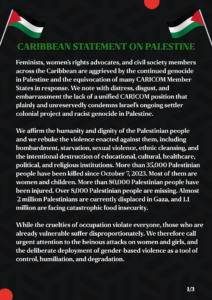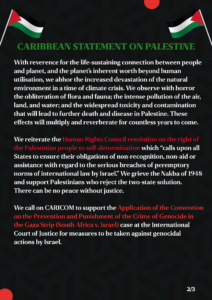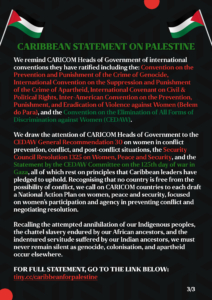We all want and need to see ourselves. No matter how different we are, how unique our circumstances, it is important to know that there are other people have similar experiences, facing similar struggles, failing in the same ways, and trying to find the light at the end of the tunnel. Sometimes we find this when we, or others, are bold enough to share stories, ideas, and work in progress. Many of us are deeply private, have been convinced whatever goes wrong for us are signs of personal failings, and rely heavily on ourselves to save ourselves, so we talk very little about challenges we face, and try to show only the highlight reels. This means that, in many cases, the only time we really see ourselves, and that the difficulties we encounter are not just are own, it is in the arts. Movies, television shows, plays, and music, remind us that the human condition, and human suffering, are not so different that they cannot be shared with others.
In The Bahamas, we spend a substantial amount of time and energy trying to convince one another that we live in paradise. More specifically, we try to make one another believe that we have access to the paradise we work our fingers to the bone to create for other people, particularly through the tourism industry and acting as extensions of it for our survival. Every now and then, someone uses art to capture a true, true Bahamian moment or phenomenon and, no matter how saddening or embarrassing, the loudness of the truth brings us joy.
Yes, that is a real thing that happens! Yes, that was a ruinous act! Yes, that was a spectacular failure! Yes, that is exactly how things do not work around here!
Yes, that is just the kind of attitude those people give us every time. Yes, that is how many times we have to call before anyone ever calls back. Yes, that is how much more money that necessity costs than what any of us can afford. Yes, that is how mad we get when those people tell us the same nonsense over and over again, expecting us to believe it. Yes! Truth! Facts! Preach!
As angry as people in New Providence were about the road works at the time, hearing “da road dem dig up dig up,” tickled us greatly. We sang along, able to find the humor in a months long saga that made the drive from anywhere to anywhere else much too long and frustrating as detours seemed to send us all around the earth. It was a shared experienced. We could rant about it at work, at family gatherings, and on the phone with friends, but the song was different. It pointed out the absurdity of the experience and the inconvenience to all, and it made us laugh at it. It eclipsed our frustration. It plainly stated the truth, so we all felt seen and together in the maze, yet made it possible to see it as a moment in time would always be remembered by those of us who experienced it, and with something other than anger.
Bahamian plays do something like this for us all the time. They, through very specific events, create portals that take us to our own experiences. We are watching the scene unfold while recalling our own stories, knowing almost exactly what will happen next, but not knowing exactly how. It is in these moments, in theaters, laughing alongside other Bahamians and residents of The Bahamas, that we see the universality of this life. It is then that we feel a connection to, a kinship with, other Bahamian people. We have this in common. This dysfunction, this feeling of being stuck, this knowing that we could be better, and we could be more. This incredulity about our circumstances, this appreciation for the creative people who put our realities on the page, to music, and on the stage. We are together in our knowing, in our wishing, and in our perceived inability to, as individuals, make any of it different.
On Monday night, I went to the opening of Short Tales which is easily my favorite part of the Shakespeare in Paradise festival. Early in the year, there is a call for 10-minute plays by new writers. The selections are made, and the audience at Shakespeare in Paradise is treated to ten new plays. These plays are funny, gut-wrenching, and thought-provoking. They are set in places we all know well, from livings rooms to funeral homes. This year, the ten writers include Imani Ashari, Patrice Francis, Deon Simms, and S.A. Hanna. One play teleported a young Black man to a kitchen in the 1700s. Imagine what happened there. Another gave a lesson on five women in the Bahamian Women’s Suffrage movement. My personal favorite of the night gave a glimpse into the inner (not) workings of the government system. Whether you want to be doubled over in laughter or have something to think about for days to come, there are a few short plays in the mix for you.
Ten minutes is not a long time, but buy a ticket to Short Tales and see what the writers, directors, and actors do with theirs. You can see Short Tales on Friday at 8pm, or next week Tuesday, Thursday, or Saturday at 8pm.
This year, the Shakespeare play is Hamlet 50/50—Hamlet with a twist. The cast includes T-Day, Julian Reid, Patrice Francis, Joanna Hepburn, and Chigozie Ijeoma. Get your tickets for tomorrow at 8pm, or Saturday, next week Monday, Wednesday, or Friday at 8pm. Visit shakespeareinparadise.org for the full schedule and online purchases.
Shakespeare in Paradise is now in its 16th year, with its theater home at The Dundas Center for the Performing Arts in need of financial support. Since the need to replace the air conditioning in the Winston V. Saunders Theatre, the larger theater space at The Dundas, arose in 2020, that space has been closed. The Black Box, which seats 70 people, has become the temporary space for all productions. It does not generate enough revenue to cover the expenses, so yes, buy tickets, and buy festival shirts and make donations if you are able to do so.
The Dundas needs us to survive and, in many ways, we need The Dundas to survive. It is where we go to see ourselves. It is where creative writers take their work and hold up the mirror so we can see ourselves. The stage is a place to lay the truth and dare anyone to refute it. It Is the place to provoke action. It is the place to generate emotion. It is a place we need, and an experience we love. Nothing we love can stand without a foundation to support it.





